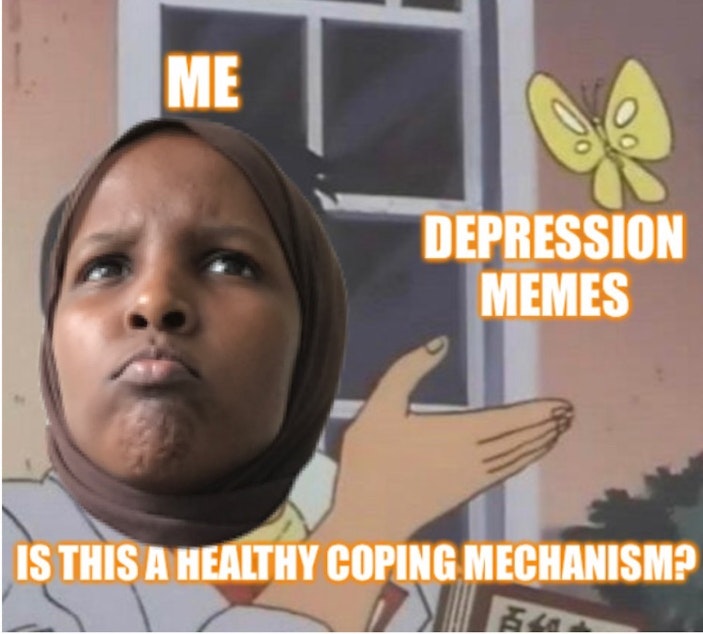Why I stopped looking at depression memes even though some of them were really funny

If you've ever been online, you've probably seen plenty of memes. Kermit the Frog drinking tea is a famous one. They are often humorous, but there's a darker side of internet memes that focus on depression.
I have seen a lot of them, and I started to wonder if they helped people cope with mental illness, or were a cry for help.
I spend a lot of time on social media to keep up with my family and friends, and to entertain myself. I scroll through my feed, looking at cooking videos, dance practices and cat videos. But what I find the most entertaining are the memes. Whenever I find one that I love, I share it with my brother, Jama.
One of my favorites is of a student in an acting class from the 90s saying, "I don't need friends, they disappoint me."
Internet memes can be photos, phrases, videos or something as vague as a concept that people share online. But there's another world of memes tagged as #depression that take on an entirely new meaning.
Sponsored
I didn't think too much about these memes until I came across one about suicide. That's when I started questioning whether this was really a good way to deal with my depression.
I reached out to Dr. Erin Vogel, a Postdoctoral Fellow in Psychiatry at the University of California, San Francisco, and we looked at a few depression memes together.
We had a laugh at some together, but when I shared one meme, I got a different reaction. The meme read, "My anxiety explaining to my depression that I can't kill myself because I don't know what happens after I die."
"Oh wow," Dr. Vogel laughed. "That's one that probably resonates with a lot of people who have anxiety and depression, and an example of one that's kind of funny but also pretty dark."
Sponsored
These darker memes can be a bit disorienting but still somehow enjoyable. I started to think about the people on the other end who create and share these memes. I worried about whether they needed help.
I asked Dr. Vogel about the negative aspects of these meme communities.
"I think the issue is if people bring problems or concerns to others that their peers might not have the expertise or the maturity to handle," she said.
For example, if someone was experiencing suicidal ideation, "if they're talking to another group of teenagers online about that, those teenagers might not necessarily know how to help them, and it could be really overwhelming," Dr. Vogel said.
I think I did feel overwhelmed. When I liked posts and shared memes, I thought about the anonymous person behind the account: how they were doing in school, with family, with life... and possibly coping with mental illness?
Sponsored
I knew I had to step away from these memes, and tell my brother about my decision since we like to share memes together.
"I never thought of it like that," my brother Jama told me, "but I get why you wanna stop. I think I'll still look at them, though."
Unlike my brother, I know if I keep seeing these memes, I'll keep worrying because I can't always be sure the people behind them are getting the love and support they need.
I've unfollowed most of the accounts and pushed myself to find new ways to find relief when things get to be too much. I'm slowly starting to fill my notebooks once again with my ramblings and writings, and I play Gil Scott Heron's jazzy poems and songs when I want to feel like I'm in another place.
This story was created in KUOW's RadioActive Advanced Producers Workshop for teenagers, with production support from Mary Heisey. Edited by Liz Jones. Find RadioActive on Facebook, Twitter and Instagram, and on the RadioActive podcast.
Sponsored
Support for KUOW's RadioActive comes from the Bill & Melinda Gates Foundation Discovery Center.



